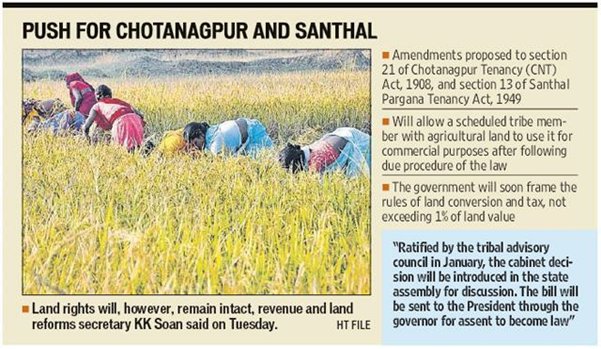

16th June 2022 (6 Topics)
Context
A public interest litigation before the Supreme Court seeks changes in two decades-old laws that restrict the sale of tribal land to non-tribals.
- The petitioner urged that specially the tribals of Jharkhand need reforms in the laws for development in the area to begin.
About
- There are basically two major laws in the region namely
- The Chota Nagpur Tenancy (CNT) Act, promulgated in British India in 1908
- The Santhal Parganas Tenancy (Supplementary provisions) Act, promulgated in newly independent India.
Purpose of the Acts
- The purpose of both these Acts was to prevent tribal land from being grabbed by non-tribals.
- Both Acts stipulate that no tribal land should be used for any commercial purposes.
- They add that tribals can sell land only to other tribals.
- Farmers of the same tribe can buy and sell land among themselves but for that, they have to take permission from the district collector.
- Also, land cannot be given on lease for more than six years under the Act.
- No commercial work can be done on the leased land.
Exception
- But, these Acts are applicable in all the districts of Jharkhand except the Santhal Parganas division.
- That division consists of six north-eastern districts namely Sahibganj, Godda, Pakur, Deoghar, Dumka and Jamtara.
How this exclusion became a challenge?
- Exploitation and deprivation: The exclusion of division made exploitation of tribals in the region and even they are deprived of other governmental facilities.
- Underdevelopment and poverty: Government schemes for development works cannot be implemented in these areas, due to which these areas remain underdeveloped and poor.
- No right to sell: Due to the acts for tribals, they are not being able to mortgage their land since banks do not give loans for these lands as collateral owing to the provisions of the laws.
- Illegal sale: At the same time, more than 70 per cent of tribal land is being bought and sold illegally despite the Acts.
Constitutional provisions
- Part X of the Constitution contains special provisions relating to administration of Scheduled Areas and tribal areas.
- Article 244 (1) of the Constitution provide that the Governor may make regulations for the peace and good government of any area in a State which is for the time being a Scheduled Area.
- It also prohibits or restricts the transfer of land by or among members of the Scheduled Tribes in such area, regulates the allotment of land to members of the Scheduled Tribes in such area; regulate the carrying on of business as money-lender by persons who lend money to members of the Scheduled Tribes in such area.
- The Panchayats (extension to the Scheduled Areas) Act, 1996
- It provides for the extension of part IX of the Constitution relating to Panchayat to the Scheduled areas.
- The Act, inter-alia, provides that the Gram Sabha or Panchayats at the appropriate shall be consulted before making the acquisition of land in the scheduled areas for development projects and before resettling or rehabilitating persons affected by such projects in scheduled areas.
- The Scheduled Tribes and Other Traditional Forest Dwellers (Recognition of Forest Rights) Act, 2006:
- Seeks to recognize and vest the forest rights and occupation in forest land in forest dwelling STs and OTFDs who have been residing in forests for generations. The responsibility for implementation of the Act lies with the States/UTs.
- Right to Fair Compensation and Transparency in Land Acquisition, Rehabilitation and Resettlement (RFCTLARR) Act, 2013
- In order to ensure fair compensation and timely and proper rehabilitation of displaced tribal people across the country, adequate provisions has been made under the act.
- The Act also lays down procedure and manner of rehabilitation and resettlement (R&R) wherein R&R is an integral part of the land acquisition plan itself.
Suggestive measures
- Amendments in the act governing forest and tribal rights in the region will help.
- Control in Corruption and Strict administrative authorities can save tribal rights and their exploitation.
- Involvement of Civil societies in educating tribals.



